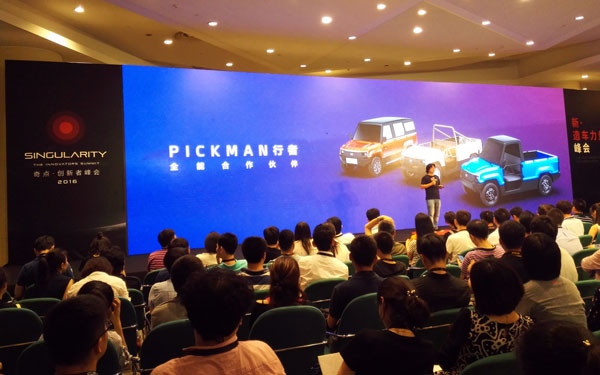
Wang Chao, founder of Kaiyun Motor Co, speaks at the forum "The New Generation of Transportation", held by Geek Park, in Shanghai, July 15, 2016. (Photo/chinadaily.com.cn)
A new wave of car making has hit China following Tesla's entry into the Chinese market and the government's policies to boost electric cars.
At a forum held by Geek Park, one of the country's leading tech communities that gathers geeks, developers and investors, in Shanghai on Friday, Daniel Kirchert, chief operating officer of Future Mobility Corporation Ltd (FMC), said electric vehicles will be the solution for future and the company will launch its first product before 2020 that can rival Mercedes Benz, BWM and Audi.
FMC was cofounded by luxury carmaker China Harmony Auto Holding Ltd, Apple Inc supplier Hon Hai Precision Industry Company Ltd and internet giant Tencent Holdings Ltd, drawing on the strengths of internet technologies in car making. Before joining FMC, Kirchert was head of Infiniti Motor Co in China.
"China will absolutely be the world's largest electric vehicle market in 2016. The Chinese automotive industry has enormous opportunities to take the lead in combining electric vehicle technologies and seamlessly connected self-driving technologies," said Kirchert through a video clip delivered to the forum.
Wang Chao, founder of Kaiyun Motor Co, viewed a vast market for electric vehicles, estimated at 150 million to 200 million units annually, taking into account the demand for pedicab and that for delivery of food, vegetables, daily necessities and even materials for home decoration.
Known for designing a children's SUV for his son, Wang stressed the importance of happiness brought by technologies to users. "In the era of electric vehicles, no one has the absolute advantage," he said. "We compete with one another to see who is able to transmit happiness to the users via our designs," he added.
Starting to engage in the design and R&D in new energy cars in 2013 and setting up a factory in North China's Hebei province last year, the company released its first electric pickup "Pickman" in May this year, priced at 23,800 yuan ($3,557).
Wang welcomed more geeks to join his team to discover unmet demand for electric vehicles and bring about new ideas in car making.
The automobile industry is transforming from the model of "business to customer" (B2C) where the car manufactures make large-scale production of vehicles and market them to the customers, to "customer to business" (C2B), where users' participation becomes an essential part of car making and their individual demand is taken into full account, said Zhu Weidong, assistant to the chairman of SAIC Maxus.
During the first phase in making its SUV D90 concept car, more than 1,000 users participated in its offline survey and over 300,000 users took part in the test driving of competitive products via its interactive platform, putting up suggestions for the product's 18 specifications, according to Zhu.
Based on the customers' feedback, D90 has made all seats except the driver's seats movable to offer larger, flexible room for passengers.
The company will allow users to engage in the adjustment of 60 specifications including inner decoration and the original chassis and the suspension system in the next step, he said, revealing that D90 will be launched onto the market in September 2017.
As more and more companies engage themselves in the research and development of self-driving cars, NVIDA, a global leader in visual computing, wishes to apply its graphic and deep learning technologies in self driving, according to Zhang Jianzhong, vice-president of NVIDA and general manger of NVIDA China.
One of the key links in self driving is to identify environment around the car, said Zhang. NVIDIA has developed a virtual network called DRIVENET, which has a high accuracy of graphic identification. And its deep learning server DGX-1 can help self-driving car manufacturers to collect and test data with its strong computation capacity equivalent to 250 CPU servers, Zhang introduced.
At the forum, Geek Park unveiled its list of Most Expected New Forces of Car Making for 2016 based on capital strength, human resources, technical innovation and geek spirit. The list includes FMC, Le Super Car, the electric car branch of LeEco Holdings Co and electric vehicle start-ups Chehejia and NextEv.


















































